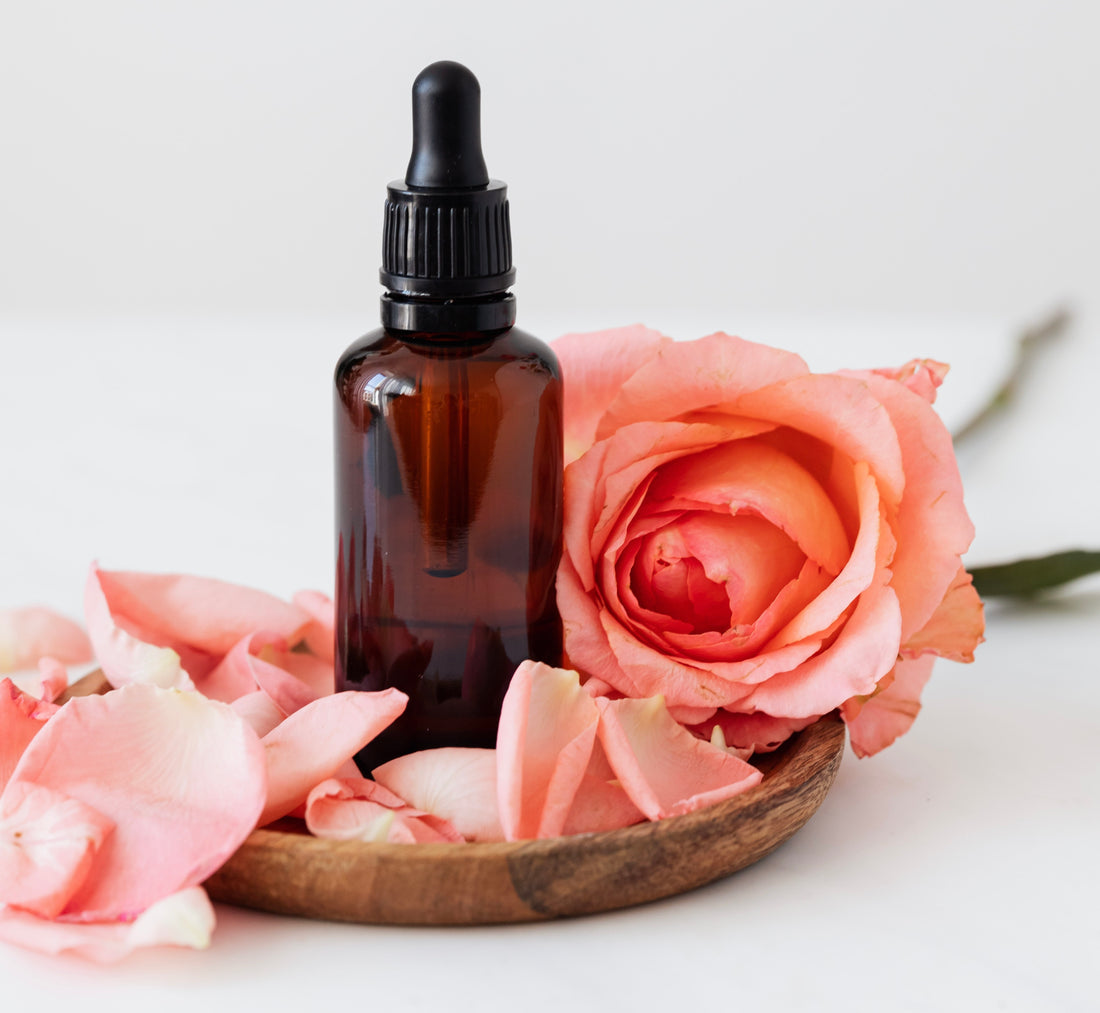Welcome back to our new series where every month we will be highlighting an essential oil, its properties, benefits and uses to help you grow your understanding and learn how to use essential oils and aromatherapy in your daily life.
Essential Oil of the Month:

Rose.
No flower embodies love and romance quite like the rose. The essential oil of rose Rosa damascena (Mill.) is also known to provide psychological and emotional support when added to a bath blend or diffused into the air. It’s a mood booster that can promote joy, relaxation, as well as memory and mental clarity.
Poets and lovers have long extolled the virtues of the rose, but this flower is more than just a pretty array of fragrant petals.
According to research, the essential oil derived from the rose plant has a wide range of potential benefits. Although a lot of the research to date has been based on small trials, some clear physiological and psychological benefits have emerged.
These beautiful flowers also hold incredible health boosting benefits! Rose essential oil has been used to treat health conditions and used in natural beauty treatments for thousands of years.
- Where does rose essential oil come from?
It most often comes from the damask rose (Rosa damascena) plant, but it can also come from the cabbage rose (Rosa centifolia) plant.
The oil is steam distilled from the flower petals. The oil distilled from damask roses is sometimes sold as Bulgarian rose oil or Bulgarian rose otto. Bulgaria and Turkey are the top producers of rose oil from the Rosa damascena plant.
- What can it do?
With its potent composition of anti-inflammatory elements, Rose Essential Oil is the ideal ingredient to harness your glow. Use topically to help reduce the appearance of redness and puffiness.
Its ability to help heal and protect the surface of the skin, rose oil is a great ingredient to promote a youthful complexion. Geranium Essential Oil and Sandalwood Oil are also prime combatters of the signs of premature ageing.
Rose Oil also has deeply nourishing properties that can help propel your skin to the picture of health. Replenishing your skin with this Essential Oil can help to leave your complexion appearing bouncier, brighter and more luminous. Don’t forget to lock in moisture with an Essential Oil such as Marjoram Oil.

- How is it used?
If you’re a budding aromatherapist, natural products manufacturer, or perfumer, rose R. damascena essential oil is a standard floral for your tool kit. When 100 perfumers were asked to select a standard for a floral aroma, they chose Bulgarian rose.
Rose oil has a warm, deep floral, slightly spicy, rich, honey-like odor. The absolute is unique in that it has a high tenacity alongside a deep, rosy fragrance. Distilled rose otto has more of a top note, and absolute rose has more fixative power.
Rose is the perfect oil to blend with other florals like jasmine or geranium, to create sweet, romantic, and uplifting fragrances. On a chemical level, rose R. damascena contains about 2% of a sesquiterpene alcohol and farnesol, which is an important constituent for perfumery. Additionally, the esters, the nerol, the nonyl aldehyde, and trace constituents (such as carvone and rosefuran) are all important for perfumery.
- How could I use rose oil as part of my self care routine?
Rose oil is usually quite expensive and is highly potent. It should be diluted whether you plan to inhale it or use it on your skin.
1) To make a rose oil bath, add 10 drops of rose essential oil to a carrier oil, then add to a warm tub. Essential oils should always be diluted in a carrier oil before adding to water.
2) To make a foot bath, add a few drops of diluted rose oil into the foot bath and soak your feet for 10 minutes.
3) To treat anxiety, stress, or depression, you can either inhale rose oil using a diffuser or dab it lightly on your chest, neck, and wrists. Be sure to blend it with a carrier oil first like coconut, almond, or jojoba oil before it touches the skin. You may also benefit from a rose oil massage, in which the rose essential oil is added to a carrier massage oil.
Before using any alternative or complementary treatment, talk to your doctor about any current medical conditions, possible drug interactions, or side effects.
- How can rose oil help me?
A number of clinical studies have found that rose oil helps to improve the symptoms of depression. In a 2012 studyTrusted Source, a small group of postpartum women underwent treatment for depression.
One group received aromatherapy in addition to conventional medical treatments. The women who used aromatherapy improved significantly more than women who used conventional medicine alone.
Studies have also found that rose oil stimulates the release of the chemical dopamine. Researchers believe this chemical plays a pivotal role in helping to relieve the symptoms of depression.
Research experts advise that you opt for aromatherapy massage to treat depression rather than inhalation. It may take as many as eight weekly sessions before you notice a change in the depressive symptoms, so you may need to exercise a little patience.

- Fun fact!
Two studies have found that inhaling rose oil increased sexual desire and sexual satisfaction among men and, to a lesser extent, women. One studyTrusted Source involved male participants with a major depressive disorder who were taking antidepressants, and the other studyTrusted Source involved female participants with the same disorder and also on antidepressants.
Researchers believe that the release of dopamine in the brain, a known motivator, may be what spurs the increase in sexual desire, while simultaneously alleviating symptoms of depression.
- Where can I get rose oil from?
You can find rose essential oil in natural food stores or shop for rose oil online.
The two most common rose oils are distilled from the R. damascena, which has a higher oil content, and R. centifolia varieties. Experts at the University of Minnesota recommend that you check the label for the Latin name of the plant and the country of origin so you can get a good idea of the source.
Here's a top tip when looking for rose essential oil always look for dark amber or dark blue bottles, since light damages essential oils.
If you’re buying rose oil in a brick-and-mortar store and a tester is available, check to see if the essential oil has been combined with a vegetable oil. Place a small droplet on a piece of paper and look for an oily ring, which could mean that the oil has been diluted.


